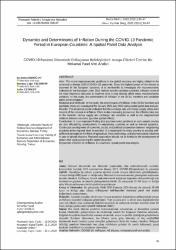| dc.contributor.author | Erdoğan, Serkan | |
| dc.contributor.author | Yıldırım, Durmuş Çağrı | |
| dc.contributor.author | Gedikli, Ayfer | |
| dc.date.accessioned | 2022-05-11T14:33:32Z | |
| dc.date.available | 2022-05-11T14:33:32Z | |
| dc.date.issued | 2020 | |
| dc.identifier.issn | 1307-671X | |
| dc.identifier.uri | https://doi.org/10.18678/dtfd.794107 | |
| dc.identifier.uri | https://hdl.handle.net/20.500.11776/7787 | |
| dc.description.abstract | Aim: The recent macroeconomic problems in the global economy are highly related to the coronavirus disease 2019 (COVID-19) pandemic. Since the highest spread of the disease is observed in the European countries, it is worthwhile to investigate the macroeconomic indicators in the European Union (EU) member and the candidate countries. Inflation is one of the most important indicators to examine since it may directly affect many macroeconomic variables. In this study, the determinants of inflation in the 28 EU members and candidate states are investigated. Material and Methods: In this study, the determinants of inflation in the 28 EU members and candidate states are investigated for January 2020-July 2020 using spatial panel data analysis. Results: The empirical results indicated that the exchange rate and money supply ratios were reasons of the increase in inflation. There is also increasing pressure on the inflation rates due to the domestic money supply and exchange rate variables as well as the neighborhood relations between countries (positive spatial effects). Conclusion: It is an important finding that macroeconomic problems in each sample country are also affected by developments in neighboring countries as well as internal dynamics. Continuous development of economic, social, and political cooperation between neighboring countries at the regional level is essential. It is reasonable for every country to develop self-sufficient strategies in the fields of agriculture, food, technology, and pharmaceutical industries in case of global disasters. Regional cooperation should not be limited to the development of sectors that stand out during the pandemic period. © 2020, Duzce University Medical School. All rights reserved. | en_US |
| dc.language.iso | eng | en_US |
| dc.publisher | Duzce University Medical School | en_US |
| dc.identifier.doi | 10.18678/dtfd.794107 | |
| dc.rights | info:eu-repo/semantics/openAccess | en_US |
| dc.subject | COVID-19 | en_US |
| dc.subject | EU countries | en_US |
| dc.subject | Inflation | en_US |
| dc.subject | Spatial panel data analysis | en_US |
| dc.subject | Article | en_US |
| dc.subject | coronavirus disease 2019 | en_US |
| dc.subject | economic aspect | en_US |
| dc.subject | European Union | en_US |
| dc.subject | general spatial model | en_US |
| dc.subject | inflation rate | en_US |
| dc.subject | pandemic | en_US |
| dc.subject | spatial autoregressive model | en_US |
| dc.subject | spatial durbin model | en_US |
| dc.subject | spatial error model | en_US |
| dc.subject | statistical model | en_US |
| dc.title | Dynamics and Determinants of Inflation During the COVID-19 Pandemic Period in European Countries: A Spatial Panel Data Analysis | en_US |
| dc.title.alternative | Dynamics and determinants of inflation during the covid-19 pandemic period in european countries: A spatial panel data analysis | en_US |
| dc.type | article | en_US |
| dc.relation.ispartof | Duzce Medical Journal | en_US |
| dc.department | Fakülteler, İktisadi ve İdari Bilimler Fakültesi, İktisat Bölümü | en_US |
| dc.identifier.volume | 22 | en_US |
| dc.identifier.issue | Special Issue 1 | en_US |
| dc.identifier.startpage | 61 | en_US |
| dc.identifier.endpage | 67 | en_US |
| dc.institutionauthor | Yıldırım, Durmuş Çağrı | |
| dc.relation.publicationcategory | Makale - Uluslararası Hakemli Dergi - Kurum Öğretim Elemanı | en_US |
| dc.authorscopusid | 56625634400 | |
| dc.authorscopusid | 56127310200 | |
| dc.authorscopusid | 57091681300 | |
| dc.identifier.scopus | 2-s2.0-85097281606 | en_US |



















